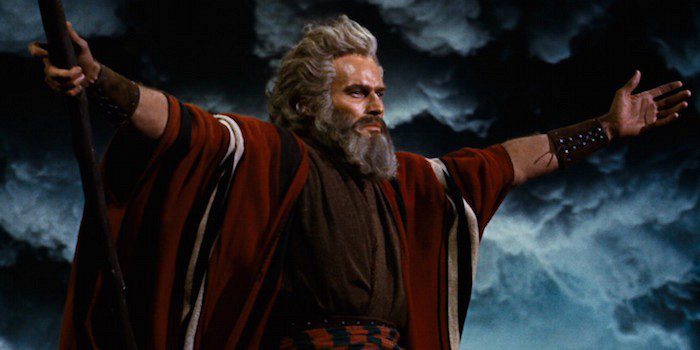Over the past week as terrorist attacks have happened in Paris, Beirut, Baghdad, Mali, and Nigeria, I’ve found myself haunted by a passage from the Bible. In Exodus 32, Moses has just come down from Mt. Sinai with his stone tablets of God’s law and he sees the Israelites worshiping a golden calf and running wild through the camp. So he calls the sons of Levi to him and he says, “Go back and forth from gate to gate throughout the camp, and each of you kill your brother, your friend, and your neighbor.” After they slaughter 3000 random people, Moses says, “Today you have ordained yourselves for the service of the Lord.” So was Moses a terrorist just like ISIS, Al Qaeda, and Boko Haram?
Many of you will howl at such an impious question. It’s completely anachronistic, right? Today terrorism is generally defined as the intentional slaughter of innocent civilians. So were the Israelites in Exodus 32 innocent civilians? Well, they certainly weren’t innocent from God’s perspective because they were worshiping an idol. You could also say they weren’t civilians because every single able-bodied male among them would have been conscripted into fighting battles against their enemies without a second thought.
There are three things that bother me about Moses’ massacre of the Israelites in Exodus 32. First, he had just received the Ten Commandments on Mt. Sinai, the sixth of which is “Thou shalt not kill.” So why isn’t the slaughter of 3000 people a violation of the sixth commandment? God didn’t tell Moses to kill the Israelites. In fact, Moses had just argued God out of killing all the Israelites in Exodus 32:9. So the sixth commandment isn’t all that much of a commandment after all.
Secondly, the Israelites had never received instruction prior to the Ten Commandments that God was not to be worshiped in the form of any graven image. They were being punished for a sin that had not yet been declared a sin. Moses could have come down and said, “Look guys, it was noble of you to sacrifice all of your gold in order to build a beautiful statue to represent the God who brought us out of Egypt, but actually that’s not the way we’re supposed to worship him. The second law God just gave me forbids it. So let’s melt the gold back down and give it back to everyone who chipped in.”
Third, God doesn’t respond at all to Moses’ massacre even though it violated one of the Ten Commandments. After Moses has killed 3000 Israelites as collective punishment for doing something that had not been previously forbidden, he then says that he’s going to go back up the mountain and make atonement for their sin (but not his). God then says that he will punish the Israelites who worshiped the golden calf (again) by sending a plague against them (Ex 32:35). So not only are the Israelite collectively punished for breaking a commandment they had not yet been given by a man who violated a commandment that he had been given, but they are given double jeopardy in the form of Moses’ massacre and God’s plague. It’s almost as if the biblical editor smashed together two different fragments of stories that were completely unaware of each other (hmmm).
So let’s say you’re a modern Bible reader and you want to follow Moses’ example when it comes to ridding the world of idolatry. What are the golden calves of our age and where are they worshiped? Let’s say you were walking through the financial district in Manhattan one day in the late 1990’s and came across a bronze bull on the sidewalk in Bowling Green Park. Then you looked up and saw two giant towers that captured the might of the global financial empire. That’s where you would go to take out your 3000 people as collective punishment for the idolatry of global capitalism.
Why is it not okay to kill 3000 people as collective punishment for their culture’s idolatry? It’s not because the Bible clearly forbids it. Sure, the sixth commandment forbids it, except that the guy who received this commandment completely ignored it right after receiving it and God didn’t care, which effectively indicates that the sixth commandment has no meaning. Perhaps it means don’t kill other people for selfish reasons, but if you think they’re dishonoring God, then go ahead. The God of Exodus has no problem with the mass killing of random people in response to perceived dishonor against his glory.
Plenty of Christians have killed in the name of God in the past. But somehow throughout the course of our history, the sanctity of human life came to have a greater value than the honor of God. This meant that blasphemers and idolaters were no longer deemed worthy of being burned at the stake. This evolution happened in conjunction with the secularization of western society. I wonder to what degree the secularized consciousness of our society is what has tempered our religious-based violence over the past couple of centuries.
I’m not sure what to do with that as a Christian. It seems arrogant and disrespectful to the text to act as though Exodus 32 and every other Bible story can be neatly assimilated into a diagram of “covenants” which explain away all of God’s most unsavory deeds in the Old Testament. If you can justify what Moses did in Exodus 32, then you have likewise justified Al Qaeda’s deed on September 11th. Either it’s terrorism to massacre random people as collective punishment for a society’s idolatry or it isn’t. If it’s anachronistic to say that, then it’s anachronistic to call the Bible authoritative in our world today. There’s nothing less sinful about our idolatry today than when the Israelites were worshiping a golden calf they hadn’t been told not to worship.
There is certainly a more beautiful vision of God available to us in our faith, but I can’t see this God anywhere in the story of Exodus 32. Pentecostal theologian Chris Green suggests that the texts of terror in the Old Testament are meant to stir up protest in us when we’re reading them. Perhaps the way in which Exodus 32 is “God-breathed and useful for teaching” is to make us recoil in horror and say that can’t be what God wants from us. Perhaps the Holy Spirit’s purpose in saddling us with embarrassing, crude caricatures of God in our sacred canon is to keep us humble when we would otherwise want to claim that other religions like Islam are inherently violent and that Muslims can only be peaceful by secularizing themselves and betraying their faith.

















